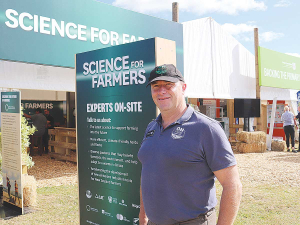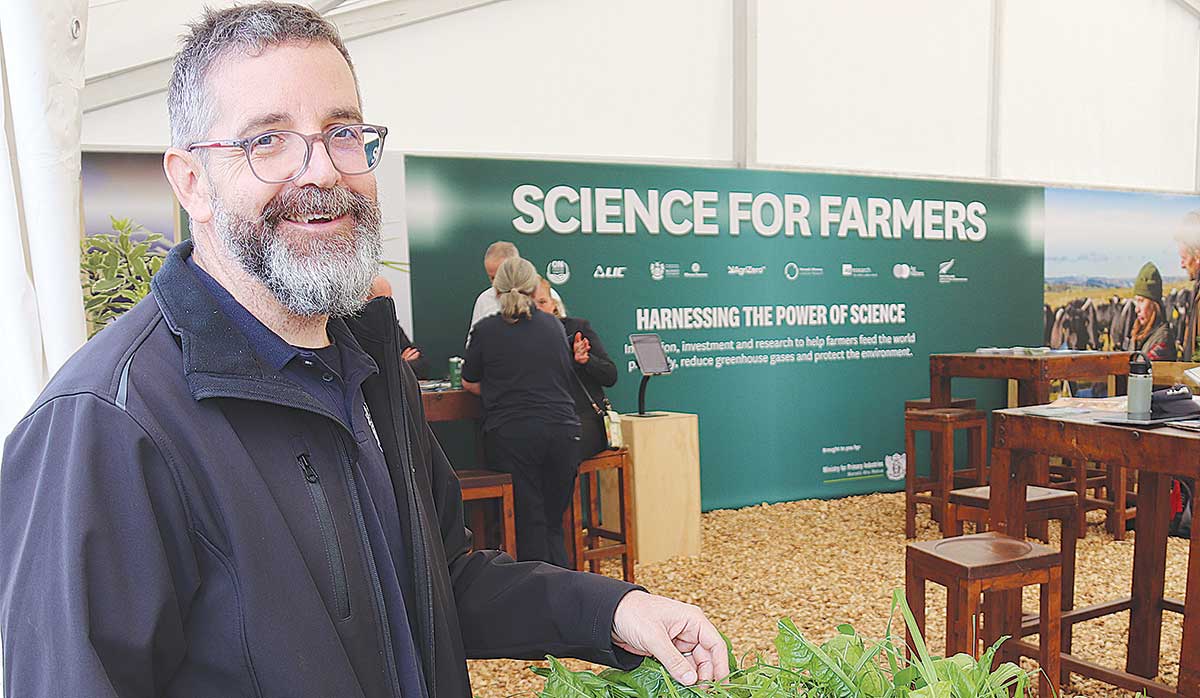MPI Hails Kiwifruit Boom as Horticulture Revenue Surges Past $9 Billion
Ministry for Primary Industries (MPI) Director General Ray Smith is giving a big shout-out to the horticulture sector, especially kiwifruit.
 MPI’s John Roche says the message he got from farmers was they hardly ever had the opportunity to meet face to face with scientists.
MPI’s John Roche says the message he got from farmers was they hardly ever had the opportunity to meet face to face with scientists.
An initiative by the Ministry for Primary Industries (MPI) to connect farmers with scientists is taking off judging by the response at recent regional field days.
MPI's new Science for Farmers stand drew a lot of interest at this month's Central District Field Days.
The aim was replicate, albeit on a smaller scale, the golden era of the 1960s and 70s when thousands of farmers flocked to the annual Ruakura Farmers conference with its talks and farm tours and the chance to meet face to face with scientists.
The numbers of farmers at the Science for Farmers site were understandably modest compared with what happened 50 years ago but it is seen as start to establish a forum where farmers and scientists can meet one on one to talk through issues. The idea for Science For Farmers came about when Dr John Roche, MPI's director of On Farm Support, and MPI director general Ray Smith visited Ireland just over a year ago.
John Roche, who's Irish, attended what's called the Irish Ploughing Championships but in fact is a huge agricultural event similar to, but bigger than, our National Fieldays and attracts more than 300,000 visitors over three days.
At this event, Roche and Smith visited the site of the Irish collective science organisation called Teagasc, which is similar to what our MAF looked like 40 years ago, where scientists, educators, advisors and policy makers are all part of the same organisation.
"What we saw at the Teagasc site was huge numbers of farmers talking to scientists, asking them questions and in turn the scientists were getting feedback about the issues that farmers would like to learn more about," Roche told Rural News.
Back in NZ, Roche says as he travelled around the country, the message he got from farmers was they hardly ever had the opportunity to meet face to face with scientists.
"Interestingly when I talked to scientists, they told me they hardly ever see farmers," he says.
Armed with that feedback, Roche and his team approached several of the science providers such as Massey University, AgResearch and LIC and hence was born the concept of Science For Farmers, which now takes the form of a special stand at regional field days and will also be present at National Fieldays.
Diverse Pasture Display
One of the talking points at the Science For Farmers site was the work being done by Massey University on diverse pasture species. This is part of the seven-year Whenua Haumanu project on regenerative agriculture.
Dr Andrew Cartmill is leading the work on pastures which involves comparing contemporary perennial ryegrass and white clover pastures with the more hyper diverse pastures to see how these perform.
Cartmill says they are basically looking at everything from the soil right through to animal performance but points out that it is pasture-based study.
"From this and the previous field days, farmers are really interested on how the pasture looks; they are keen to know if it performs as well as what they are hearing from other sources. It's our job to find out what does and doesn't perform because we are a neutral party in this seven-year study," he says.
Cartmill says they started out trialling some 20 different grass species and have now refined this down to just seven. He says the animals seem to like the diverse pasture and appear to be performing very well in it. But he points out the study is still in its early stages and more work is needed to get a clear picture of the benefits of diverse pastures and also the cost of such benefits.
 |
|---|
|
Dr Andrew Cartmill, Massey University, is leading the work on pastures. |
On Show At Central District Field Days
On the CD Field Days stand were representatives of the many science providers and MPI. The site was set up to make dialogue between farmers and scientists easy. The display boards are interactive and the people on the stand engaging.
John Roche, MPI, says they have been talking to farmers about greenhouse gas emissions and the technology and ways available to mitigate impacts on farm. He says genetics is another popular talking point as is new research into diverse pasture species.
"We have been having some great conversations because our people are talking to farmers about things that nobody has talked about with them in the past," he says.
Roche says they have been making farmers aware of the fact that if they breed animals for efficiency, that will lead to a lower greenhouse gas footprint. He says the animal health plan is something that farmers often don't see as a priority.
"But a healthy herd produces more milk, needs less feed for maintenance and produces lower somatic cell counts and other animal health matters," he says.
Roche says based on the feedback from the central district and other field days, MPI and its partners will have an even bigger display at the June National Fieldays.
Fonterra’s impending exit from the Australian dairy industry is a major event but the story doesn’t change too much for farmers.
Expect greater collaboration between Massey University’s school of Agriculture and Environment and Ireland’s leading agriculture university, the University College of Dublin (UCD), in the future.
A partnership between Torere Macadamias Ltd and the Riddet Institute aims to unlock value from macadamia nuts while growing the next generation of Māori agribusiness researchers.
A new partnership between Dairy Women’s Network (DWN) and NZAgbiz aims to make evidence-based calf rearing practices accessible to all farm teams.
Despite some trying circumstances recently, the cherry season looks set to emerge on top of things.
Changed logos on shirts otherwise it will be business as usual when Fonterra’s consumer and related businesses are expected to change hands next month.

OPINION: Here w go: the election date is set for November 7 and the politicians are out of the gate…
OPINION: ECan data was released a few days ago showing Canterbury farmers have made “giant strides on environmental performance”.